There are more DIY skincare recipes on the internet than you can shake a stick at, and most of them really, really like lemon juice.
According to these DIY tips you should be slathering it all over your face and hair. Lemon juice smells nice, and it’s pretty cheap. But is it effective? And is it safe?
Let’s talk about the science behind lemon juice.
Here’s the video version – keep scrolling down to read!
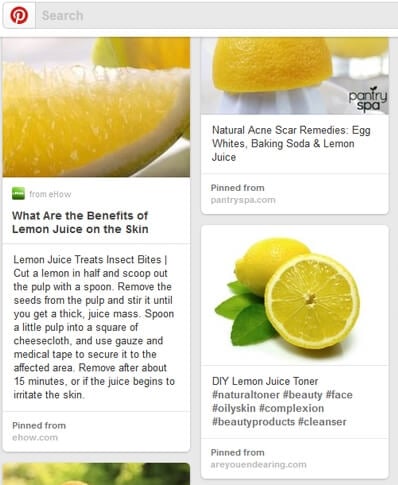
Is lemon juice effective?
Lemon juice contains a lot of ingredients that are used in skincare:
- Vitamin C: Lemon juice contains vitamin C in the form of ascorbic acid. Vitamin C does a great job at evening out pigmentation without too much irritation, and could help increase collagen in your skin as well. It’s also an antioxidant that counteracts free radicals, making it good at protecting your skin from the sun.
- Citric acid: Citric acid is an alpha hydroxy acid (AHA). You can read more about AHAs in skincare here, but in short they’re great for exfoliating your skin, making it look plumper and smoother.
Related Post: The Essential Guide to Exfoliation
- Niacin (vitamin B3): This is anti-inflammatory, helps with pigmentation and alleviates dry skin as well. More about niacinamide here.
Related Post: What is Niacinamide
So yes, lemon could be great for your skin! But before you rub a lemon on your face, there are a few issues with using lemon juice…
Related Post: How to Get Glowing Skin: All About Exfoliation (Video)
How strong is a lemon?
Not only do you need a skincare product to have effective ingredients, you also need skincare products to have enough of each effective ingredient. This is also known as the dose-effect relationship – the smaller the dose, the smaller the effect, until at some point you have so little that there’s no effect.
Since lemons are natural ingredients, the amounts in them can vary. You know how different varieties of apple can taste completely different? Or how different brands of apple juice look and taste different? Or how an unripe banana is nothing like an overripe banana? That’s because they contain different amounts of chemicals in them.
Related Post: Are Natural Beauty Products Better?
This is exactly the same for lemon juice – the amount of each good ingredient in your lemon will depend on all sorts of things, like where it was grown, the time of year, how long it’s been sitting around for, the variety of lemon, whether the lemon was kept refrigerated or at room temperature after picking… there’s no guarantee that you’ll be able to replicate a recipe.
But in a typical sample of lemon juice, you’ll find 0.04% ascorbic acid, 5% citric acid and 0.0001% niacin.
Normally in skincare, serums will have 5-15% ascorbic acid, 2-15% AHA, and 2-10% niacinamide. So in lemon juice, you only really get a decent amount of citric acid.
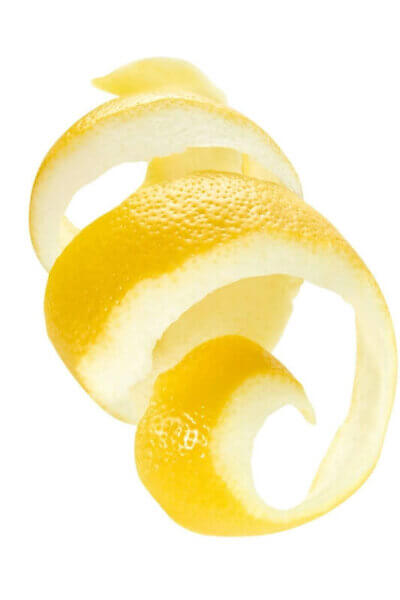
Is lemon juice safe?
Onto the more important question: is lemon juice safe to use in skincare? Unfortunately, the answer is… probably not. While food might feel benign since we eat it all the time, it’s often a different story if you try to use them in skincare.
There are millions of other chemicals in lemon juice, and some of these are not good for your skin.
Phytophotodermatitis
The citrus fruit peels often contain chemicals called furanocoumarins and psoralens. These are fine in the shade, but if you get them on your skin and then go into sunlight, they turn into nasty skin irritants.
There are many stories of people who have gotten lemon juice on their skin and gone into the sun – the result was nasty blistering burns!
You can tell how common it is from all of the reports in the literature of this happening with citrus juice.
- Mioduszewski M, Beecker J. Phytophotodermatitis from making sangria: a phototoxic reaction to lime and lemon juice. CMAJ. 2015;187(10):756. doi:10.1503/cmaj.140942
- Hankinson A, Lloyd B, Alweis R. Lime-induced phytophotodermatitis. J Community Hosp Intern Med Perspect. 2014;4(4):10.3402/jchimp.v4.25090. Published 2014 Sep 29. doi:10.3402/jchimp.v4.25090
- Safran T, Kanevsky J, Ferland-Caron G, Mereniuk A, Perreault I, Lee J. Blistering phytophotodermatitis of the hands after contact with lime juice. Contact Dermatitis. 2017;77(1):53-54. doi:10.1111/cod.12728
- Marcos LA, Kahler R. Phytophotodermatitis. Int J Infect Dis. 2015;38:7-8. doi:10.1016/j.ijid.2015.07.004
These phototoxic compounds can be removed from citrus essential oils by processing though, and a few don’t contain these at all (e.g. tangerine), so not all finished products containing citrus need to be avoided. But there’s no easy way to separate them if you DIY!
Chemical Leukoderma
DIY lemon juice skincare has also been linked to chemical leukoderma, where patches of skin depigment – in other words, you end up with uneven lightened patches on your skin.
For example, this article has photos of what happened to one woman who tried using a lemon juice toner – instead of evenly fading pigmentation, the lemon juice faded it in patches, leaving spots everywhere.
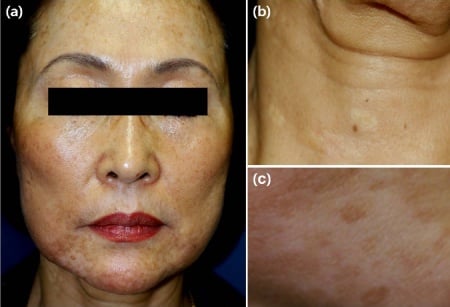
Another person ended up with depigmented patches after using lemon juice on their face for 5 days.
It’s not entirely clear how exactly lemon juice does this – it could simply be the low pH of 2, which is lower than pretty much all skincare products except peels, which are applied carefully and neutralised, instead of being left on skin.
Lemon isn’t even that cheap
Lemon might seem cheaper than a properly formulated skincare product, but it turns out it isn’t even that cheap.
Citric acid is the only active ingredient in lemon juice that’s in a high enough concentration to do anything. But it’s actually cheaper to go out and buy pure citric acid and dissolve it in water. A jar of citric acid is $2.25 for 75 g. To get the same amount of citric acid from lemon juice (assuming that a lemon containing 30-45 mL of lemon juice with 5% citric acid costs $1.78), you’d be paying $60-89.
I still wouldn’t recommend making this DIY serum. While this would avoid the blistering photodermatitis, it won’t necessarily help you avoid chemical leucoderma (since the pH is still quite low unless you adjust it). And because citric acid is quite a large molecule, it’ll work better in a properly formulated product that’s designed to help the citric acid penetrate through your skin.
It’s hard to compare against properly formulated AHA products, since very few of them use citric acid at all, and the formulas are quite different (different percentages will have different effects, and they often contain other beneficial ingredients too, and the effectiveness of the formulations will vary).
But if we do a very rough comparison, for the same number of acid molecules (1 mole):
-
- 1 lemon (5% citric acid, $1.78 for 30-45 mL) = $152-228 per mole
-
- KraveBeauty Kale-lalu-yAHA (5.25% glycolic acid, $25 USD = $35 AUD for 200 mL) = $254 per mole
- The Ordinary Glycolic Acid 7% Toning Solution ($14.50 for 240 mL) = $66 per mole
- The Ordinary Lactic Acid 5% + HA 2% ($12.40 for 30 mL) = $794 per mole
- The Ordinary Lactic Acid 10% + HA 2% ($12.70 for 30 mL) = $407 per mole
- Pixi Glow Tonic (5% glycolic acid, $28 for 100 mL or $45 for 250 mL) = $274-426 per mole
- CosRX AHA 7 Whitehead Power Liquid (7% glycolic acid, $25 for 100 mL) = $272 per mole
- Acne.org AHA+ (10% glycolic acid, $26.33 for 177.42 mL or $46.49 for 473.12 mL) = $75-113 per mole
- Paula’s Choice 8% AHA Gel (glycolic acid, $39 for 100 mL) = $371 per mole
So not only are there lots that are comparable in price to lemon juice, there are actually a couple of finished products that end up being cheaper than lemon juice in terms of AHA molecules you get! And you have the added of being safe, and having a delivery system that’s more likely to work.
Lemon isn’t always unsafe
While it’s incorrect to say that lemon juice is always unsafe in DIY recipes, there are enough scary stories to make you think twice!
If you still want to use lemon juice after all this:
- Don’t use leave-on recipes with large amounts of lemon juice (more than a few drops)
- Be cautious when using lemon juice for rinse-off recipes (e.g. masks or hair rinses), especially if there’s a large amount of lemon juice in it, and make sure you wear sunscreen next time you go into the sun.
- Stop immediately if you see any signs of irritation or depigmentation!
References
Hankinson A, Lloyd B & Alweis R, Lime-induced phytophotodermatitis, J Community Hosp Intern Med Perspect 2014, 4, 25090. DOI: 10.3402/jchimp.v4.25090
Almeida HL Jr et al., Transmission electron microscopy of the preclinical phase of experimental phytophotodermatitis, Clinics (Sao Paulo) 2008, 63, 371-4. DOI: 10.1590/S1807-59322008000300014
Gye J et al. Chemical leucoderma induced by homemade lemon toner, Australas J Dermatol 2014, 55, 90–92. DOI: 10.1111/ajd.12133
Kumar K et al. Contact leucoderma caused by lemon, Indian J Dermatol Venereol Leprol 1996, 62, 61. PMID: 20947980
This post contains affiliate links – if you decide to click through and support Lab Muffin financially, thank you! For more information, see Disclosure Policy.
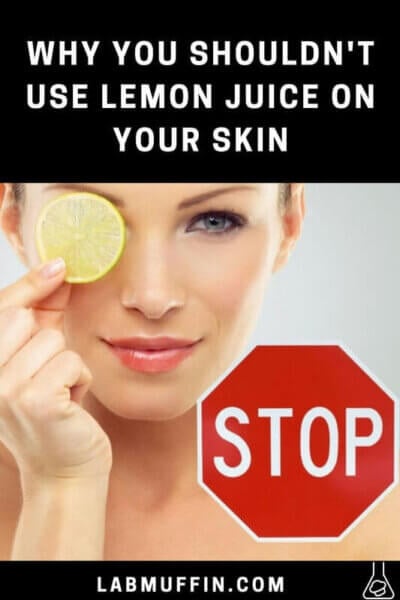
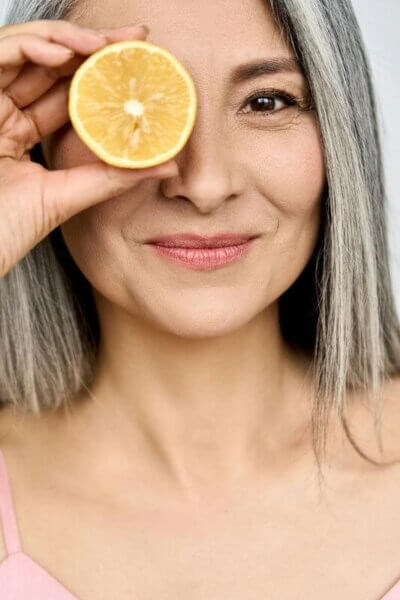
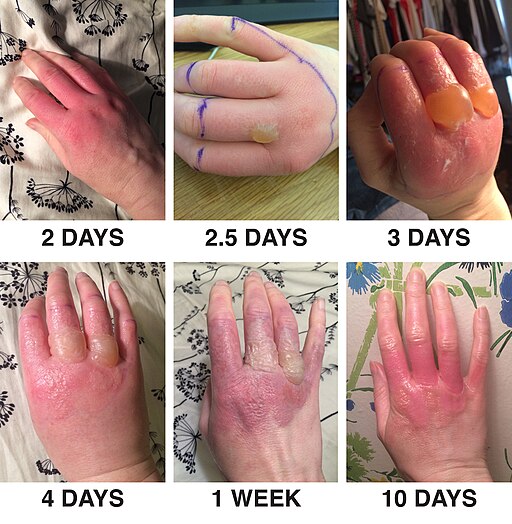


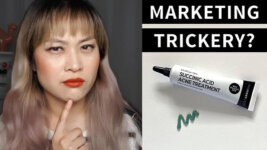
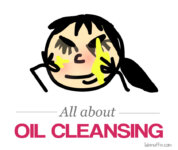
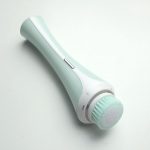
Never thought of using a lemon on my skin .. I think it’s best squirted into your water <3
Monica, http://www.pear-shaped-gal.com
Or on pasta! Yum.
I haven’t tried using lemon juice (and lemon skin) on my face though so many people recommend it to me. I’ve read in some blogs that it’s simply not good, but you give the most logical reason. Thank you so much like, I would only use it in infused water 🙂
The only thing I use lemon juice for is a replacement for deodorant. Works like a charm!
Lemons do lighten your skin but once your lemon-treated skin is exposed to sunlight, the results are nothing but unwanted darker shade that you really are. I have used it and know it from experience that though it can for a few days fetch you awesome compliments, but the later results are just not worth it. So I have stopped using them completely. Even tomato though less acidic than lemons give the same effect. Learnt my lesson the hard way…Not going to try it again. there are many other natural alternatives to getting a fair skin, currently chic pea powder being my favorite..
Yep, with any lightening treatment you need diligent sun protection, otherwise it ends up worse!
Haven’t used it on my skin, but used to use it (sprayed on with water) on my hair for natural highlights. That is until I realized that it was frying my hair. Yes, it added more highlights to my dirty blond hair, but it also left those portions brittle and prone to frizz. Yikes. It took months for my hair to recover even if I immediately washed it out and conditioned as soon as coming inside.
I use fresh squeezed lemon juice on my face and hands several times a week, and I put it in my water all the time. I’m 50 and I look like I’m 25. I’ve never had a wrinkle on my face and never had a cavity in my teeth.
You’re lucky! The people with patchy skin and blisters weren’t so lucky.
Oh dear! I’ve been religiously applying lemon juice all over my body for the past few days, but so far, there are no signs of blisters or patchy skin popping out. You see, I apply lemon juice on my body during the night, including the face (though to be on the safe side, I add a bit of water). Is it bad to follow this? I don’t go out in the sun with lemon on my skin though. I only apply it on the evening. I’m worried because most of the articles are saying that lemon juice is terrible for your skin.
I don’t think it’s a good idea – what results are you after? There are probably more effective and safer ingredients that you can use!
Hmm. Quite the claims there. I also notice everyone who makes these kind of wild claims never has a photo to prove it.
I would think it’s far more likely you are trolling, a bit delusional or simply have poor eyesight than 50 and actually looking 25. Never met a single person who came across like that, not once. It’s pretty easy to guess people’s ages with plus/minus 5 years simply looking for normal signs of ageing due to gravity, normal fat loss in the face, as well as normal personality and generational verbal cues. A 50 year-old who speaks and acts like a 25 year-old would be pretty cringey anyway.
Hey Michelle, I jumped on the probiotics in skincare craze and ordered The Beauty Chef Probiotic Skin Refiner, but I didn’t even think twice about lemon juice being in the ingredients.. sigh.
What do you think? should I return it? or would it be too small a percentage to worry about? I’m most concerned about the phototoxic properties.
Ingredients:
Purified water, naturally and organically grown: grains (wheat, rye, oats, maize, brown rice), grasses (alfalfa, barley, wheat), algae, (spirulina, chlorella, dunaliella salina) seeds (millet, flaxseed, buckwheat), legumes (chickpeas,mung beans, lentils, adzuki beans, soya beans), lemon juice, honey, agave, lactic acid, lactobacillus.
Oh wow, I had no idea about that uneven depigmentation. That looks really scary!
Anne – Linda, Libra, Loca
Yikes… well thanks for exposing the science to back it up! As someone who’s suffered from dermatitis/fungal acne in the past, I’ve had all kinds of people recommend crazy diy skincare solutions. Baking soda and lemon was one of them, but putting those things on my face sounded like a recipe for chemical burns, or something I’d use to clean grease off a stovetop… good to know my instincts were right!
I do diy my own super basic face mist using glycerin, distilled water, and a bit of preservative… but that’s as far as my own diy goes. Very curious to try your kiwi mask suggestion, and would appreciate more of your science-y know how re proven diy skincare you’d happily recommend!
I had a small marble dish that I really liked. Since I loved the smell of lemon, one day I decided to put a cut lemon in it to set out so I could smell it. The next thing I knew, the lemon had ruined the dish. It had ‘eaten’ into the marble – no nice, smooth surface. I had no idea lemon was that strong. So, yeah, it never felt like a safe thing to put lemon on my skin, diluted or otherwise.
The only thing I use lemon, besides to dress my salad, is to clean my kitchen counter. Never thought on using it on my skin (and never thought anyone is using it for their skin).
Oh really! I did not now that lemon juice can even harm us on our skin. Great article and thanks a lot for letting me know this.
Thanks for sharing this valuable info with us.
Thanks for great content, once again.
I have a question regarding essential oil that are phototoxic. Do you advise on being cautious when using products that are fragranced by the help of photosensitive essential oils? Or is it, as you say, most probable that they have been processed enough to lose that side effect when they’ve been added to the creams?
I have a question . what if we use lemon juice mixed with honey on the skin in 1:2 ? Because, i have been using been using it for quite alot of time and i am worried what it might do to my skin . and, i have also heard that lemon ages your skin more quickly . please , clear my doubts.